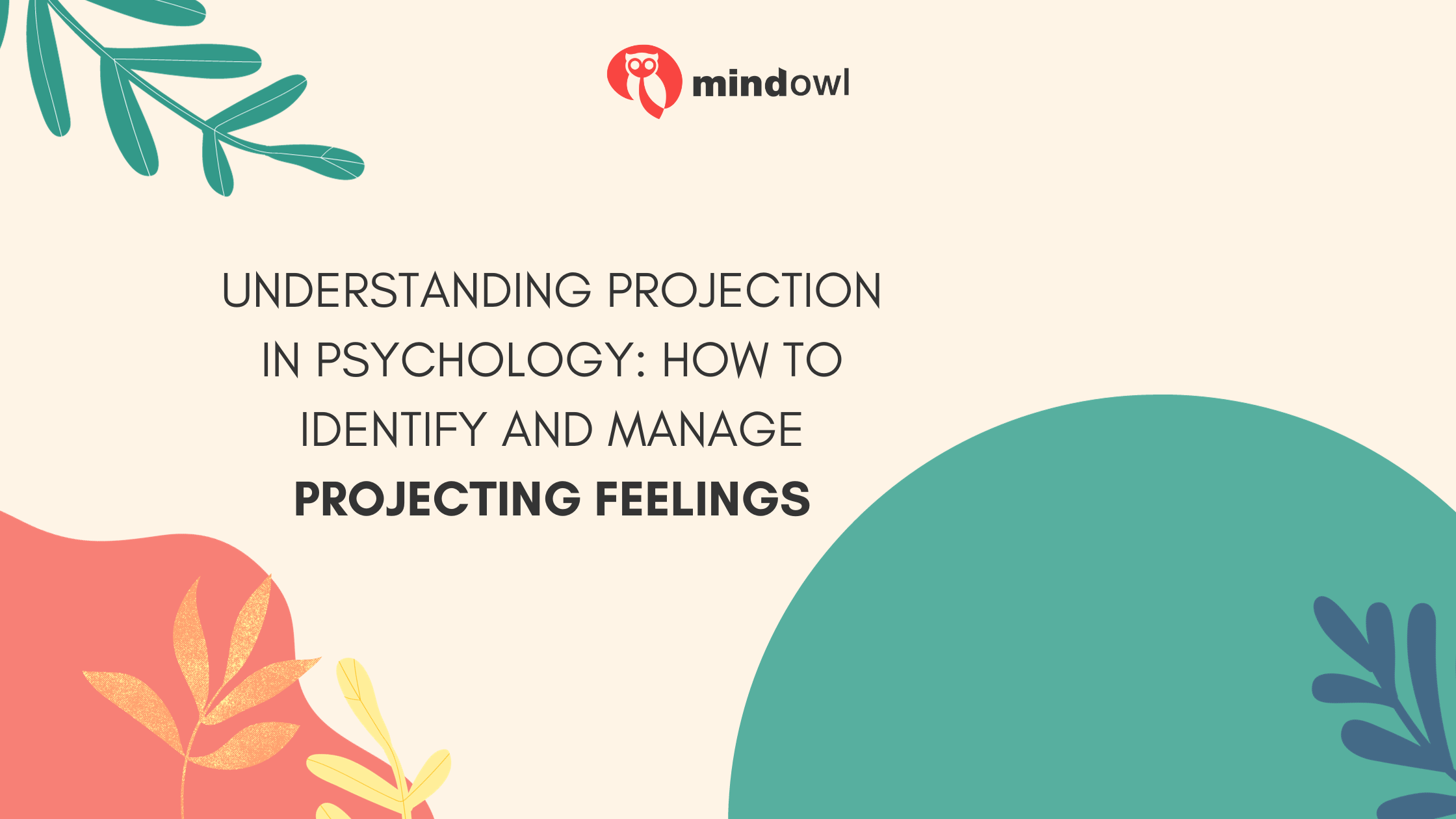
Are you finding it hard to see why people keep accusing you of things that aren’t true? This may be due to psychological projection, a defense mechanism where individuals attribute their own feelings or traits onto others.
This article will guide you in understanding the concept of projection and how to manage it if it’s affecting your day-to-day life. Get ready for a journey within yourself that could potentially transform your relationships!
Key Takeaways
- Projection in psychology is when people attribute their own feelings or traits onto others, often unconsciously.
- Signs of projection include deflecting responsibility, blaming others, and difficulty accepting feedback. It can lead to misunderstandings and a lack of trust in relationships.
- To manage projection, set boundaries, stay calm, communicate openly, and seek support if needed.
- Types of projection include Freudian projection, neurotic projection, complementary projection, and complimentary projection. Understanding these types can help identify and manage projecting behaviors.
What is Projection in Psychology?
 Projection in psychology refers to the defense mechanism where individuals attribute their own thoughts, feelings, and traits onto others, often unconsciously.
Projection in psychology refers to the defense mechanism where individuals attribute their own thoughts, feelings, and traits onto others, often unconsciously.
The meaning and definition
Projection is a trick our mind plays. It moves our thoughts, feelings, or traits onto someone else. This term came into use in psychology. Often, when we have bad traits or emotions we don’t want to face up to them ourselves.
So instead of accepting these negative parts of ourselves, we see them in others around us. This way, it’s like they are the ones with the problem and not us. We call this process “projection”.
Examples of projecting behavior
Let’s dive into some examples of projecting behavior:
- Jane has a compulsion to lie, but instead she accuses everyone around her of being dishonest. This shows Jane likely projects her dishonesty onto others.
- Mike often bullies his classmates. He may project his own feelings of low self – esteem and insecurity onto them.
- Sarah is often jealous of her friends’ successes. This might be Sarah projecting her own sense of failure onto her friends.
- Bill always blames others for his mistakes at work. His blame – shifting could be a sign that he is projecting his lack of responsibility onto his colleagues.
- Emily accuses her boyfriend of being overly jealous when in reality, she’s the one battling with jealousy issues in their relationship.
Causes of projection
People project their feelings onto others for many reasons. Sometimes, they feel too bad or scared to accept how they feel. Projection works like a shield against these hard feelings.
At times, people may have thoughts and emotions that are not okay with them. They might think these feelings make them a bad person. So, instead of dealing with these unwanted feelings, they pass it on to others.
This is what we call “projection.” People also use this as a way not to blame themselves for things going wrong in their life. It’s easier to say someone else did something wrong than admit you made an error.
Signs and Effects of Projection
 Signs someone is projecting onto you include deflecting responsibility, constantly criticizing and blaming others, and having difficulty accepting feedback. The impact of projection on relationships can lead to misunderstandings, resentment, and a lack of trust.
Signs someone is projecting onto you include deflecting responsibility, constantly criticizing and blaming others, and having difficulty accepting feedback. The impact of projection on relationships can lead to misunderstandings, resentment, and a lack of trust.
Knowing how to respond to projection involves setting boundaries, staying calm, and encouraging open communication.
Signs someone is projecting onto you
- Constantly criticizing or accusing you of behaviors that they themselves engage in.
- Blaming you for things that are not your fault or responsibility.
- Making baseless accusations without evidence or logical reasoning.
- Refusing to take responsibility for their own actions and projecting the blame onto you.
- Dismissing your feelings and emotions while exaggerating or magnifying their own emotions.
- Becoming defensive and hostile when confronted with their projection behavior.
- Having a consistent pattern of projecting onto others in various relationships and situations.
Impact of projection on relationships
Projection can have a negative impact on relationships. When someone is projecting their feelings onto another person, it can lead to misunderstandings and conflicts. The person doing the projecting may blame others for their own faults or constantly criticize them.
This creates a lack of emotional intimacy and trust in the relationship. It’s important to recognize when projection is happening and address it by developing self-awareness, taking accountability for one’s own emotions, and seeking professional help if needed.
Managing projected feelings is crucial for maintaining healthy relationships.
How to respond to projection
- Recognize the signs: Pay attention to the behaviors and language that indicate someone may be projecting onto you. Look for blame-shifting, baseless accusations, or constant criticism.
- Stay calm and self-aware: Take a moment to reflect on your own feelings and reactions. Keep in mind that projection is about the other person’s insecurities, not your own worth.
- Avoid getting defensive: Instead of reacting defensively, try to respond calmly and assertively. Validate their feelings without accepting false accusations.
- Reflect on your own behavior: Consider if there might be any truth to what they are saying. Take responsibility for your actions if necessary, but don’t accept unwarranted blame.
- Communicate openly: Engage in open and honest conversations with the person projecting onto you. Encourage them to explore their own emotions and motivations.
- Set boundaries: Establish clear boundaries and communicate what behavior is acceptable to you. Let them know how their projection affects you.
- Seek support if needed: If the projecting behavior continues or becomes emotionally draining, it may be helpful to seek support from friends, family, or a therapist.
Remember, responding to projection requires empathy, understanding, and assertiveness.
Types of Projection
– Freudian projection: attributing one’s own unacceptable thoughts or feelings onto others.
– Neurotic projection: projecting irrational fears and anxieties onto others.
– Complementary projection: seeing in others the qualities that one denies in oneself.
– Complimentary projection: giving someone else positive attributes that one possesses oneself.
Understanding these types of projection can help us to identify and manage our own projecting behaviors. To learn more about each type, click here.
Freudian projection
Freudian projection is a defense mechanism in psychology where people unconsciously blame others for their own thoughts, feelings, or behaviors. It’s like when someone accuses someone else of being angry when they are actually the one feeling angry themselves.
Freud believed that this type of projection helps protect our self-esteem by avoiding uncomfortable feelings or taking responsibility for our actions. Understanding Freudian projection can give us insight into our own emotions and help us grow personally.
Neurotic projection
Neurotic projection is a common type of projection in psychology. It happens when someone puts their own negative emotions or feelings onto another person without any valid reason.
For example, if someone feels insecure about themselves, they might project those insecurities onto others and accuse them of being insecure instead. This can cause tension and misunderstandings in relationships.
Managing neurotic projection involves becoming aware of our own projections and taking responsibility for our own emotions. It’s important to recognize when we are projecting and work on understanding and addressing our own feelings instead of attributing them to someone else.
Complementary projection
Complementary projection is a type of projection in psychology where individuals assume that others have similar abilities or share the same opinions as themselves. It can make it easier for people to relate to and understand others.
Complementary projection may be used as a defense mechanism to avoid facing one’s own insecurities or differences. To recognize and manage complementary projection, it is important to become aware of our own assumptions and biases.
Complimentary projection
Complimentary projection is one of the three common types of projection in psychology. It happens when individuals assume that others share their own beliefs and values. This type of projection allows people to feel more connected to others or relate to them easily.
It is a subconscious process that helps individuals cope with difficult emotions or feelings. Engaging in complimentary projection can be a way for individuals to manage and understand their projecting feelings without realizing it.
Other projections
Other projections include:
- Baseless accusations: Making unfounded claims or blaming others without evidence.
- Bullying: Engaging in aggressive behavior to intimidate or harm others.
- Scapegoating: Blaming someone else for one’s own mistakes or problems.
- Blame-shifting: Transferring responsibility onto others instead of taking accountability for oneself.
- Jealousy: Feeling envy or resentment towards others and projecting those feelings onto them.
- Passive-aggressive behavior: Indirectly expressing anger or frustration through non-confrontational actions.
How to Stop Projecting
To stop projecting, it’s important to practice self-awareness, question your thoughts, improve communication, be open to feedback, and consider seeking professional help if needed.
Interested in learning more about managing projection? Keep reading!
Self-awareness
Self-awareness plays a crucial role in understanding and managing projection in psychology. By being self-aware, individuals can recognize patterns of projecting their feelings onto others and take steps to address it.
Developing self-awareness involves reflecting on one’s own emotions, thoughts, and behaviors, as well as recognizing the impact they have on relationships. Self-reflection and mindfulness techniques can help improve self-awareness by bringing attention to internal experiences.
Seeking therapy is also beneficial for enhancing self-awareness and promoting emotional well-being.
Thought questioning
Thought questioning is a powerful technique used to identify and manage projection in psychology. By engaging in thought questioning, we can gain a deeper understanding of ourselves and challenge the projections we may be making onto others.
This technique involves examining our thoughts and feelings, and asking ourselves why we are attributing certain emotions or qualities to someone else. Thought questioning helps us take responsibility for our own feelings rather than projecting them onto others.
It allows us to practice mindfulness and develop self-awareness, ultimately leading to healthier relationships and improved emotional well-being.
Improved communication
Improved communication skills play a crucial role in understanding and addressing projection in relationships. When we enhance our ability to express ourselves effectively and listen actively, it becomes easier to identify when someone is projecting onto us.
By openly discussing our thoughts and feelings, we can create a safe space for honest conversations about projection and its impact on the relationship. Additionally, improved communication allows us to offer support and reassurance instead of becoming defensive or confrontational when faced with projection.
It also enables us to provide constructive feedback in a non-threatening manner, helping the person projecting to gain self-awareness and work towards healthier coping mechanisms. Seeking professional help together can further strengthen communication skills within the relationship and foster more meaningful connections based on understanding and empathy.
Openness to feedback
Being open to feedback is an important aspect of managing projection feelings. It means being willing to listen and learn from others, even when it’s difficult or uncomfortable. When we are open to feedback, it allows us to gain insight into our own emotions and thoughts that may be causing us to project onto others.
This self-awareness helps us understand and address underlying issues that contribute to projecting behavior. Additionally, openness to feedback is crucial for building better relationships as it fosters communication, empathy, and understanding between people.
By being open to feedback, we can effectively manage projecting feelings and cultivate healthier connections with others.
Seeking professional help
If you’re struggling with projecting your feelings onto others and want to understand and manage this behavior, seeking professional help is important. A therapist can provide valuable insight into why you may be projecting and offer guidance on how to stop.
They can help you gain a deeper understanding of your emotions and develop healthier ways to cope with difficult feelings. Seeking professional help also allows you to address projection as a defense mechanism instead of blaming others for your own emotions.
It’s an opportunity to take responsibility for your actions.and work toward personal growth.
Understanding Projection Within Personal Relationships
Identifying projection in a partner and dealing with it can significantly improve your relationship. Read more to learn how to navigate projection within personal relationships.
Identifying projection in a partner
Identifying projection in a partner can be crucial for understanding and navigating personal relationships. It’s important to pay attention to patterns of behavior that may indicate projection.
For example, if your partner frequently blames you for their own mistakes or shortcomings, criticizes you harshly, or becomes defensive when you express your feelings, they may be projecting onto you.
These behaviors can often stem from underlying insecurities or unresolved issues within themselves. By recognizing these signs of projection, you can better understand the dynamics at play in your relationship and take steps towards open communication and resolving conflicts in a healthier way.
Dealing with projection in a relationship
In a relationship, it can be challenging to deal with projection when one person projects their negative traits or emotions onto their partner. This can lead to misunderstandings and conflicts.
To address this issue, individuals should focus on open communication and self-awareness. It’s important to understand our own emotions and triggers, and not blame our partner for things that may actually come from within ourselves.
By working on understanding ourselves better and improving our communication skills, we can manage projection in relationships more effectively.
Conclusion
In conclusion, understanding projection in psychology can provide valuable insights into our own emotions and behavior. By learning to identify and manage projecting feelings, we can cultivate healthier relationships and enhance our emotional well-being.
It is through self-awareness, improved communication, and open-mindedness that we can effectively navigate the complexities of projection and foster personal growth.
FAQs
1. What does projection mean in psychology?
Projection is a defense where you put your feelings onto someone else rather than admit to them.
2. Can you give an example of projection?
A classic example of projection might be if someone who feels insecure may accuse others of feeling that way, saying they’re projecting their emotions.
3. What did Sigmund Freud say about projection?
Sigmund Freud explained that psychological projection is a defense used often when individuals can’t accept their own negative feelings toward someone and tend to project those feelings onto the other person instead.
4. How can I stop engaging in projection?
To stop projecting your feelings onto others, it helps to look for these qualities in yourself first and understand that blame on others for things could be due to unconscious feelings within you.
5. Can there be a good kind of projection too?
Yes, people don’t only project negative qualities or feelings; they also can project positive ones onto everyone else around them. This is called social projection.
6. How can I tell if someone might be using this defense mechanism?
If notice somebody always blaming others for things or putting their own insecurities towards another person’s behavior, they might be doing what we call ‘projection’ according to theory from the field of psychology today.
Q: What is psychological projection?
A: Psychological projection is a defense mechanism in which a person unconsciously attributes their own undesirable thoughts, feelings, or characteristics onto someone else.
Q: How does projection work?
A: Projection works by allowing individuals to disown or distance themselves from their own thoughts and emotions by placing them onto others. It is typically done without conscious awareness.
Q: Can you give an example of projection?
A: An example of projection is when a person who is feeling insecure about their own abilities accuses others of being incompetent.
Q: Is projection always negative?
A: Projection can involve both positive and negative emotions. It is not necessarily always negative as it can be a way for individuals to amplify positive traits in others that they may not recognize in themselves.
Q: What is projective identification?
A: Projective identification is a more intense form of projection where individuals not only project their own feelings onto others but also manipulate them in such a way that they start to embody those projected feelings.
Q: How can I identify if I am projecting my feelings onto someone else?
A: One way to identify if you are projecting your feelings onto someone else is to become aware of any strong emotional reactions you have towards them. If your emotions seem disproportionate to the situation, it might be a sign of projection.
Q: Why do people project their feelings onto others?
A: People project their feelings onto others as a way to cope with uncomfortable or unacceptable emotions. It allows them to avoid dealing with their own feelings and instead place them onto someone else.
Q: Can projection be harmful?
A: Projection can be harmful if it leads to misunderstandings, conflicts, or strains in relationships. It can also prevent an individual from understanding and addressing their own emotions and issues.
Q: How can I stop projecting my feelings onto others?
A: To stop projecting your feelings onto others, it is important to become more self-aware and develop the ability to recognize and accept your own emotions. Therapy or counseling can also be beneficial in understanding and addressing projection tendencies.
Q: Is projection a recognized concept in psychology?
A: Yes, projection is a recognized concept in psychology and has been studied extensively. Sigmund Freud, often referred to as the father of psychoanalysis, greatly contributed to our understanding of projection.
Q: What is the difference between projection and projective identification?
A: The main difference between projection and projective identification is that in projection, individuals attribute their own feelings onto others, while in projective identification, they project their feelings onto others and also manipulate them into embodying those projected feelings.
MindOwl Founder – My own struggles in life have led me to this path of understanding the human condition. I graduated with a bachelor’s degree in philosophy before completing a master’s degree in psychology at Regent’s University London. I then completed a postgraduate diploma in philosophical counselling before being trained in ACT (Acceptance and commitment therapy).
I’ve spent the last eight years studying the encounter of meditative practices with modern psychology.

